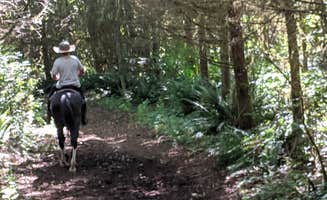Equestrian camping opportunities exist within 60 miles of Everett, Washington, with several designated horse camps providing trail access to diverse terrain. Western Washington's climate creates varied riding conditions, with summer months offering the most reliable trail access. The rainy season from October through April can impact trail conditions and campground amenities.
What to do
Trail riding at Harry Osborne State Forest: Access extensive maintained trail networks suitable for day rides or multi-day excursions. "This is primarily a horse/hiking camp. There is not access for motorized Vehicles on the mountain Any longer. There are 2 manure pits, a vault toilet, some fire pits, and a group covered table area," notes Deb E. about Harry Osborne State Forest.
Beach riding near Collins Campground: Combine forest and coastal riding experiences with campgrounds that offer river access. "Located on the east side of the Olympic Peninsula, Collins campground is a bit off the beaten path, which was what I was looking for during peak season in August. The Duckabash river runs along most of the sites," reports Heartworn H. about Collins Campground.
Mountain view trail rides from Greenstone Farm: Take advantage of smaller, private facilities with mountain views for equestrian camping. "Really nice farm with a great mountain view. Quiet rural setting but close to town (Mt. Vernon) if you need anything or just want to explore the farmer's market, as we did. Woodland trail on the 10+ acres was a real plus for our two dogs," shares Ken F. about the camping experience at Greenstone Farm Camping.
What campers like
Well-maintained facilities for horses and riders: Camps with appropriate equestrian infrastructure make camping more comfortable. "Great place to bring your LQ (any size rig) and camp with your horses... High-line poles are available to high-tie your horses. We set up a portable corral and were fine. Picnic tables and fire rings are also available," explains Elise M. about her stay.
Proximity to water sources: Access to rivers and creeks is valuable for both horses and campers. "We got an awesome river spot with our brand new set up. It rained but was a beautiful and oh so green area to camp," says Kathleen J. about their camping experience at Tolt MacDonald Park.
Multi-use trail systems: Areas with hiking, equestrian, and sometimes shared use trails provide varied terrain options. "Nice clean camping area with easy access to multiple trails and logging roads. Trails are open to hiking horseback riding and motorcycles. Camp ground has multiple horse stalls in a common area," reports Ivy K. about Green Mountain.
What you should know
Seasonal closures and conditions: Trail and campground access varies by season, with some facilities closed during winter months. "Update. Stockwater has been gaited off due to vandalism and trash dumping. You may utilize trails to walk your horses down to the water... Note that this is a working forest and may have heavy log truck traffic at times," warns Deb E.
Limited amenities at remote locations: Many equestrian campgrounds offer basic facilities without full hookups. "This is dry camping with no potable water or garbage," notes Deb E. about Harry Osborne State Forest. Similarly, for Collins Campground, Asia M. states, "Bathrooms are very limited (just 2 outhouses) and obviously no hook ups."
Reservation requirements and capacity: Some equestrian camps have limited spaces available. "We came here around 9pm on a Friday as we couldn't get any first come spots elsewhere in the area. We don't have horses but it was a pleasant area to stay in still," shares Lillie P. about Sage Horse Camp.
Tips for camping with families
Choose campgrounds with diverse activities: Look for locations with options beyond horseback riding. "told macdonald is super cute park and campground! they offer the typical primitive campsites with fire pits and picnic tables, as well as yurts and shipping container conversions for those who want more of a 'GLAMping' outdoor experience," describes Mercedes D.
Consider fairgrounds for amenities: County fairgrounds often offer more developed facilities. "Located in an historic Fairgrounds with lots of charm...and bunnies! Good sunshine in summer. Not much shade. Nicest things are the close proximity to Langley, a very quaint town with great coffee!" explains Fairgrounds C. about Whidbey Island Fairgrounds Campground.
Plan for water activities: Campgrounds near rivers provide recreational alternatives. "There are 15 sites and most are along a river with private access from your campsite. We loved staying here! There is a lot of privacy between each site too," shares Asia M. about Collins Campground.
Tips from RVers
Evaluate campground road conditions: Access roads to equestrian camps may be challenging. "Disclaimer: the road from highway 101 to the campground has SO MANY potholes. Big ones that we had to navigate in our RV but nothing that made it too hard to access the campground," warns Asia M.
Consider fairgrounds for larger rigs: County fairgrounds typically accommodate larger trailers and RVs. "It's more of a place to park then a full on campground. It has water and 30 amp power at all spots with access to a dump station. You are limited to 7 nights per month," explains Adam A. about the Evergreen State Fairgrounds.
Bring extra water supplies: Many equestrian camps have limited water access. "No water or electric at the camp, but you can drive down to a creek and pump or collect water for your horses. You will be boondocking," advises Elise M. about Harry Osborne State Forest.



